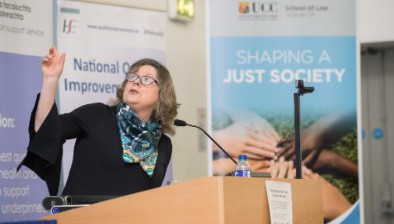High Court: Ward of court’s aunt appointed as his committee despite objections from General Solicitor

The High Court has acceded to an application appointing the aunt of a ward of court as his joint committee in addition to the General Solicitor. The General Solicitor opposed the appointment, arguing that the aunt’s disagreement with the treating doctors could undermine the ward’s treatment and impede his recovery.

About this case:
- Citation:[2022] IEHC 21
- Judgment:
- Court:High Court
- Judge:Ms Justice Niamh Hyland
Delivering judgment in the case, Ms Justice Niamh Hyland held that there was a strong presumption that a family member should be appointed as committee. It was also noted that the committee would not make substantive decisions about the life of a ward and therefore any disagreements about treatment was not a justification for refusing the application.
Background
The ward, known as Mr M, had a long history of psychotic illness and recidivist criminal offending associated with substance abuse. He also suffered schizophrenia and a significant learning difficulty. In April 2020, the Central Mental Hospital (CMH) sought interim protective orders for the involuntary detention of Mr M.
Following a contested hearing, it was concluded that the ward was a person of unsound mind and that his best interests required his detention in the CMH. Mr M was eventually admitted into full wardship in March 2021 where it was ruled that his committee would be the General Solicitor. Since Mr M was being detained involuntarily, a review of the detention took place every six months. Several issues were raised in November 2021 including the suitability of the ward’s treating consultant, his medication and his aunt acting as his committee.
Having regard to the evidence, the court held that Mr M’s best interests were served by the treating consultant continuing in her role. Further, the court was satisfied that the ward’s medication was appropriate, even though there were on very unfortunate side effects such as sedation and lethargy.
The main issue in the review was the application for Ms K, the ward’s aunt, to act as his committee. It was noted that there was a paucity of case law on contested applications for the appointment of a committee and the court requested written legal submissions from the CMH and the General Solicitor.
The General Solicitor did not object to the appointment of a family member as committee and further indicated that she was willing to continue to act as the sole committee member with the assistance of an independent specialist solicitor. However, the General Solicitor objected to serve as a joint committee with Ms K. It was stated that a joint committee with Ms K would not function properly because Ms K disagreed with the treatment of Mr M, while the General Solicitor had full confidence in his treatment.
The CMH argued that a key therapeutic goal was for Mr M to gain insight into his illness and that any matter likely to impede this progress was unwelcome. In that regard, it was said that the family had unreasonable expectations that Mr M could be managed in the community. The CMH considered that there was a ”chasm” between the family and the treating team which may have a destabilising effect on the ward.
The family of Mr M argued that a more empathetic, person-centred approach was required and that he should live in supported accommodation outside the CMH.
High Court
The court began by considering the role of a committee of a ward, which was divided into financial and personal affairs. It was noted that the General Solicitor was appointed in both roles and Ms K’s application was to be appointed in both roles as well. Further, the court outlined that neither the Lunacy Regulation (Ireland) Act 1871 nor the Rules of the Superior Courts set out the criteria to be considered when deciding on the appointment of a committee.
It was accepted that committees in Ireland were “kept on a very short leash” but were “the eyes and ears of the Court.” The court also noted that family members or trusted friends acted as the committee in 75 per cent of cases.
It was accepted that the views of the ward and his/her family should be taken into account when appointing a committee, although the family’s views should never prevail over the court’s view of the ward’s best interests (Re a Ward of Court (withholding medical treatment) (No. 2) [1996] 2 IR 79).
The court provided a summary of the relevant principles relating to the appointment of a committee which included, inter alia, that committees act under the supervision of the High Court and had no independent or inherent power. It was also stated that the appointment of a family member was preferable unless there was some reason not to make such an appointment.
It was held that the views of the committee were very important to a court exercising the wardship jurisdiction and that the committee usually relays the views of the ward to the court. However, in this case, there were “effectively no decisions” which needed to be made by the committee because Mr M was entirely in the care of the CMH.
Additionally, the court emphasised the importance of Mr M’s family life and that he had been positively supported by his relatives. As such, it was clearly in his best interests to have his family remain involved in the wardship process.
The court held that the family were not obliged to take the same view as the medical officers and, in fact, it may be useful to a court to have different perspectives put forward. Further, it was the court’s responsibility to make decisions for the ward and there was no obligation to accede to the views of the committee.
The court was satisfied that Ms K was well-equipped to convey Mr M’s views to the court and could also provide her own opinions as well. However, since she was living in Mexico, it was held that she could only become part of the committee when she returned to live in Ireland, as it was unsatisfactory to have a committee living abroad permanently.
Conclusion
The court granted the application to allow Ms K to become a joint committee with the General Solicitor.








